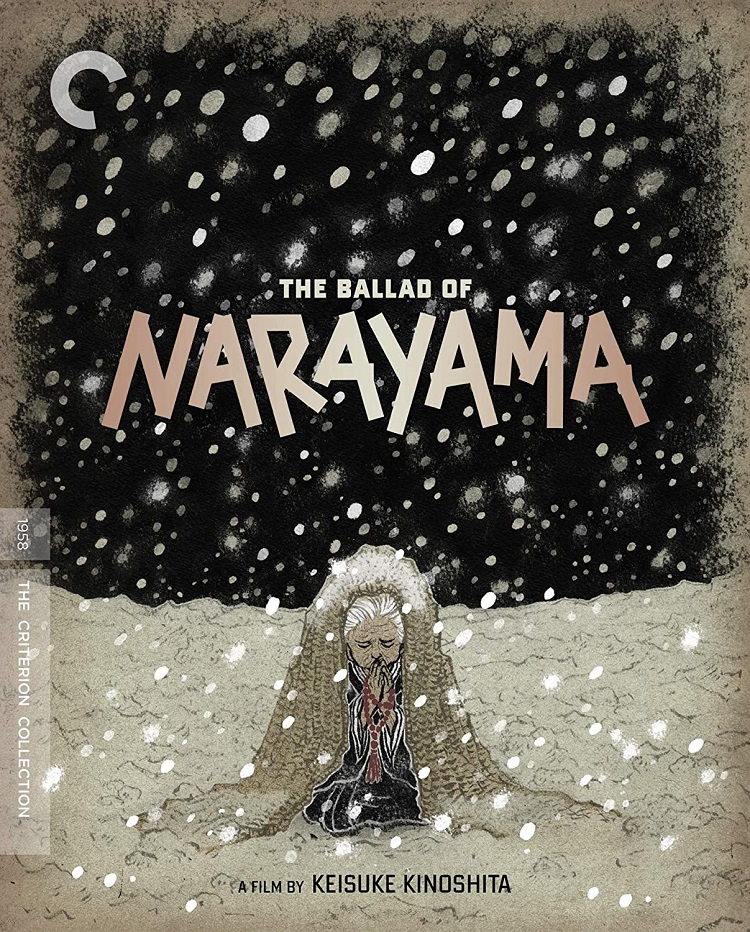
The concept of ubasute is at the centre of The Battle of Narayama, the 1958 film by Japanese director Keisuke Kinoshita. Ubasute is the alleged practice of abandoning an infirmed or elderly relative on a mountain or some other remote locale. The practice apparently took place in times of famine or drought, with the idea being that the elderly person’s death would lessen the burden on younger villagers.
The practice may not have been a common custom and its appearances may generally be confined to legends and koans, but the conception of sending away of old people is hardly mythological. Even if ubasute is allegorical in nature, its truth runs deep. Society’s rejection of age and aging is clear through every anti-wrinkle advertisement and every rush to plant grandpa in a distant nursing home.
Kinoshita presents his side of the story in the form of a sort of kabuki theatre, complete with sliding, advancing sets and lush props. There is even a narrator, a black-clad joruri who introduces the “legend” with the clacking together of two pieces of white oak (a traditional kabuki introduction). Through chanting and samisen, we meet the elderly Orin (Kinuyo Tanaka).
Orin lives with her son Tatsuhei (Teiji Takahashi) and is awaiting the arrival of a new daughter-in-law (Yuko Mochizuki). Because they live in a village stricken by famine, Orin lives with a great deal of guilt because she believes her advancing age is a burden on her family. It doesn’t help that her dickhead of a grandson (Danko Ichikawa) can’t wait for her to die.
This struggle between aging and youthfulness forms what could best be described as the trigger of The Ballad of Narayama, but Orin’s steadfastness is the emotional and spiritual centre. She believes in the ritual of Mount Narayama and understands that it is her cultural, religious and moral responsibility to be taken up to the mountain when she reaches age 70.
Orin also struggles under a great deal of guilt, especially for having all of her teeth. The kids of the village, with the help of her grandson and his pregnant wife (Keiko Ogasawara), make up a song about granny’s “33 demon teeth.” Regretful for her dental gifts, Orin smashes her choppers against a grindstone and presents her bloodied visage to the villagers.
What we have illustrated through this tale, admittedly a fable, is a morality play of sorts. Kinoshita, who directed 49 films in his diverse career, seems to be suggesting that there is a collision between perceived social responsibility and moral conviction. Tatsuhei hates the thought of dragging his mother up the mountain. He hates the inevitability of it and he hates his son’s scorn of his mother.
But on the other hand, Tatsuhei appears bound by tradition. He has to honour his mother’s wishes and, as the final scene appears to indicate, he also has to honour the cultural traditions that would also see him dragged up to Mount Narayama. Orin seems to be setting the sublime example, going so far as to chastise Mata (Seiji Miyaguchi) for not simply accepting fate and allowing his son (Yūnosuke Itō) to drag him up to destiny.
By presenting The Ballad of Narayama as kabuki, Kinoshita provides a vision that is both organic and theatrical. He does not hide that his elaborate sets are indeed sets; there is no effort made to obscure the roughly painted mountains or to excuse the sliding lights that indicate nightfall. It is a matter of confinement, in a way, and it shatters when the final shots of the picture bring us back to the real world.
The Criterion Collection Blu-ray release is quite lean. It includes only a trailer and a teaser to go with a booklet that features a Philip Kemp essay.
Visually, the transfer is quite good. The new digital master comes from the 2011 Shochiku studios and Imagica restoration, which gives the colours decent clarity. There is the usual wear and tear, of course, but overall the finished product does the trick. The uncompressed monaural soundtrack comes remastered at 24-bit from a sound positive.